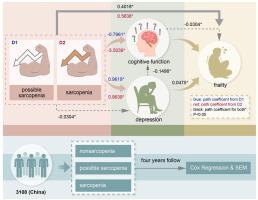Exploring the mediating roles of depression and cognitive function in the association between sarcopenia and frailty: A Cox survival analysis approach
IF 13
1区 综合性期刊
Q1 MULTIDISCIPLINARY SCIENCES
引用次数: 0
Abstract
Background
Despite earlier research indicating a potential link between the development of sarcopenia and an elevated risk of frailty, the lack of comprehensive prospective data on the correlation between sarcopenia and frailty incidence leaves open the question of whether depression and cognitive function mediate this association.
Objective
The principal aim of the current investigation was to evaluate the intricate interplay among sarcopenia, depression, and cognitive function collectively influence the risk of developing frailty.
Methods
The participants included in this study were obtained from three waves of the China Health and Retirement Longitudinal Study (CHARLS), which collectively encompassed a total of 3,108 participants. To examine the interrelationships among sarcopenia, depression, cognitive function, and the incidence of frailty, we employed Cox regression models along with structural equation modelling, while making necessary adjustments for baseline demographic characteristics and various lifestyle factors.
Results
During a 4-year follow-up, we documented 753 frailty events. Compared to those with nonsarcopenia, those with possible sarcopenia and sarcopenia presented risk ratios for frailty events of 1.354 (95 % CI: 1.156, 1.586) and 1.514 (95 % CI: 1.203, 1.907), respectively. Stratified analyses by different statuses of sarcopenia further revealed that the significant effect of depression on frailty was present across all groups (nonsarcopenia, possible sarcopenia and sarcopenia), whereas the effect of cognitive function on frailty was limited to the non-sarcopenia and possible sarcopenia groups. Mediation analysis showed that sarcopenia was correlated not only with frailty through depression and cognitive function separately but also through a chain-mediated effect of depression and cognitive function together.
Conclusions
Sarcopenia is associated with frailty, depression and cognitive function playing partial, mediating roles. Frailty’s susceptibility to depression and cognitive function differs based on sarcopenia status. Therefore, comprehensive interventions that include sarcopenia screening, interventions, improvements in depression, the promotion of mental health, and delays in cognitive decline will be more effective in preventing and delaying frailty. This effectiveness is particularly relevant for middle-aged and older adults who reside in China.

探索抑郁和认知功能在肌肉疏松症与虚弱之间的中介作用:考克斯生存分析法
背景尽管早前的研究表明,肌肉疏松症的发生与体弱风险的升高之间存在潜在联系,但由于缺乏有关肌肉疏松症与体弱发生率之间相关性的全面前瞻性数据,因此抑郁和认知功能是否会介导这种联系仍是一个未知数。本研究的主要目的是评估肌肉疏松症、抑郁和认知功能之间错综复杂的相互作用对体弱风险的共同影响。方法 本研究的参与者来自中国健康与退休纵向研究(CHARLS)的三个波次,共计 3 108 人。为了研究肌肉疏松症、抑郁、认知功能和虚弱发生率之间的相互关系,我们采用了 Cox 回归模型和结构方程模型,并对基线人口学特征和各种生活方式因素进行了必要的调整。与非肌肉疏松症患者相比,可能患有肌肉疏松症和肌肉疏松症的患者发生虚弱事件的风险比分别为 1.354 (95 % CI: 1.156, 1.586) 和 1.514 (95 % CI: 1.203, 1.907)。按不同的肌肉疏松症状态进行的分层分析进一步显示,抑郁对虚弱的显著影响存在于所有组别(非肌肉疏松症、可能的肌肉疏松症和肌肉疏松症),而认知功能对虚弱的影响仅限于非肌肉疏松症和可能的肌肉疏松症组别。中介分析表明,肌肉疏松症不仅通过抑郁和认知功能分别与虚弱相关,还通过抑郁和认知功能共同产生的连锁中介效应与虚弱相关。虚弱对抑郁和认知功能的易感性因肌肉疏松症状态而异。因此,包括肌肉疏松症筛查、干预、改善抑郁、促进心理健康和延缓认知功能衰退在内的综合干预措施将更有效地预防和延缓衰弱。这种有效性对于居住在中国的中老年人尤为重要。
本文章由计算机程序翻译,如有差异,请以英文原文为准。
求助全文
约1分钟内获得全文
求助全文
来源期刊

Journal of Advanced Research
Multidisciplinary-Multidisciplinary
CiteScore
21.60
自引率
0.90%
发文量
280
审稿时长
12 weeks
期刊介绍:
Journal of Advanced Research (J. Adv. Res.) is an applied/natural sciences, peer-reviewed journal that focuses on interdisciplinary research. The journal aims to contribute to applied research and knowledge worldwide through the publication of original and high-quality research articles in the fields of Medicine, Pharmaceutical Sciences, Dentistry, Physical Therapy, Veterinary Medicine, and Basic and Biological Sciences.
The following abstracting and indexing services cover the Journal of Advanced Research: PubMed/Medline, Essential Science Indicators, Web of Science, Scopus, PubMed Central, PubMed, Science Citation Index Expanded, Directory of Open Access Journals (DOAJ), and INSPEC.
 求助内容:
求助内容: 应助结果提醒方式:
应助结果提醒方式:


